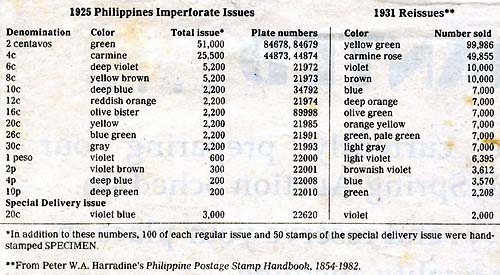| Few stories related to United States possessions
philately are more fascinating and less widely known than that of the Philippines
imperforate issues of 1925.
To understand the origins of these scarce and
beautiful stamps, it is necessary to know about the Lambert Sales Co. In
the mid-1920s, the Lambert family was socially, politically and economically
influential on both sides of the Pacific Ocean. United States operations
of the firm were located in New York City and run by Leon Lambert Sr.,
while Leon Lambert Jr. was in charge of the company's operations in Manila.
The company manufactured fancy baby apparel in the Philippines for export
to the United States, taking advantage of reduced manufacturing costs in
the islands. Finished clothing was shipped to company headquarters in New
York for distribution to United States department stores.
The cost of shipping in such an operation was
quite substantial, even by the standards of the day. Prior to 1925 the
company used regular Philippines issues to pay the postage, which sometimes
amounted to thousands of Philippine pesos each month. Concerned about internal
thefts of stamps, the Lambert Sales Co. asked Philippine postal authorities
for permission to apply a special "L.S.C." perfin cancellation that would
serve to earmark company postage and deter potential thieves. The idea
was rejected, as it would have defaced the portraits of the men honored
on the stamps, and the company sought another answer. The Bureau of Engraving
and Printing in Washington, D.C., suggested a simple solution: an issue
identical in design to the current definitives, but easily distinguished
from them by virtue of being imperforate.
The BEP offered to produce such stamps for any
Philippine company that would commit to a minimum order of 10,000 pesos
in postage. The Lambert Sales Co. was the only one- to place such an order,
contracting for postage in the amount of 10,180p. The Philippine
Bureau of Posts increased the Lambert Co. order so that copies of
the imperforate stamps could be placed on sale at the Manila post office,
presumably to satisfy stamp collectors. It is believed that Leon Lambert
Jr. felt that it was critical to control all the imperforate stamps as
an absolute defense against pilferage. Apparently, Lambert asked to be
informed when the portion of the imperforate order destined for the Manila
post office arrived. He then simply went to the post office and purchased
the entire remaining imperforate stock.

Table of the Philippine imperforate
issues of 1925 and the imperforate reprints of 1931.
As a result, few stamps if any from the original
imperforate printing were sold by the post office directly to collectors.
Some short sets of the 2-centavo through the 30c denominations were given
to personal friends of the Lambert family. The result of all this is that
virtually all used copies of the 1925 imperforate issues are found on,
or were removed from, Lambert Sales Co. package labels on its shipments
to New York.
The surviving stamps and labels from what was
initially a very limited printing present plenty of challenge for even
the most diligent collector. It is believed that about 15 percent of the
original labels were saved, and perhaps as few as one in 10 of the used
stamps from these labels are still sound. |

